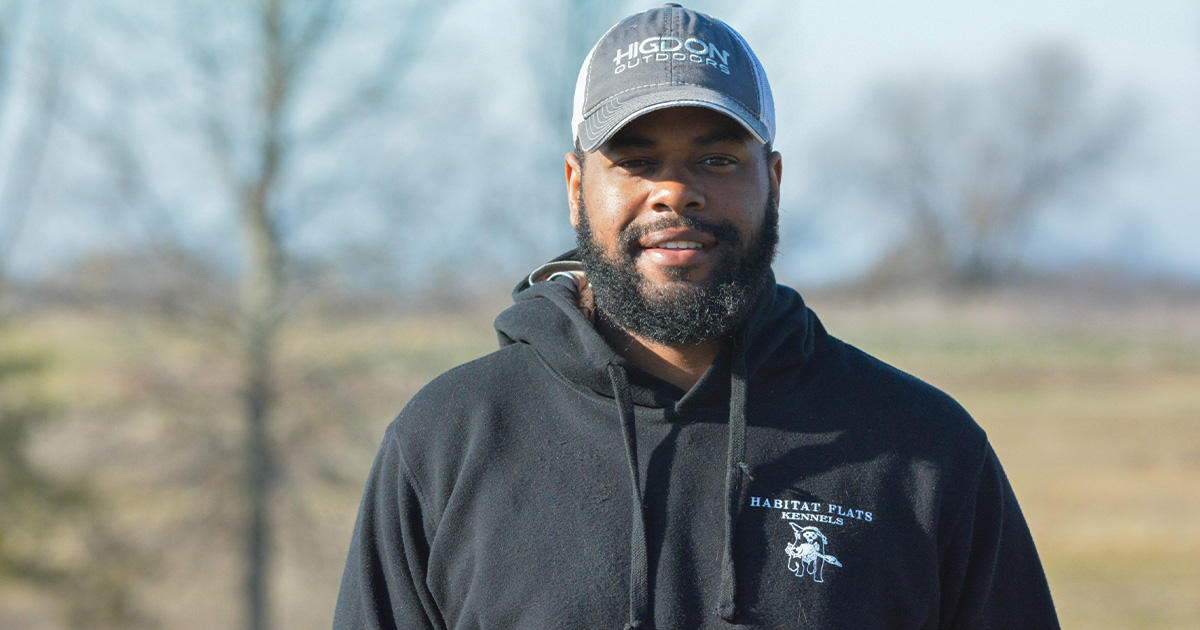Meet the Trainers: Q&A with Veteran Dog Trainer Lakeavian Star
Elevate your retriever training skills with insights from Lakeavian Star of Habitat Flats Kennels
Elevate your retriever training skills with insights from Lakeavian Star of Habitat Flats Kennels


Meet veteran retriever trainer Lakeavian Star of Habitat Flats Kennels.
Location: Northeast Central Missouri
How long have you been a trainer? 6 1/2 years
The first six months of a dog’s life is crucial and for me, the most important. The biggest thing in this stage of a puppy’s life is building confidence and momentum. You want to expose that dog to as much as you can while building desire. At the end of a dog’s first year, it should be through basic obedience, force fetched, collar conditioning, steady singles, simple doubles, and steady to shot. In other words, a basic started gun dog.
The two most common mistakes that I see are not starting your puppy with basic obedience early enough, which allows them to build bad habits and not raising your puppy in a way that teaches them at a young age what life is about (retrieving). Most people misunderstand what socializing a puppy means and it creates a dog that doesn’t understand that it is a working dog. Another common mistake that I see often is starting formal obedience before that dog has any momentum and desire. You can put breaks on them, but you can’t put gas in them. Meaning, that as a professional trainer, I will wait to begin formal obedience until I see that the puppy has retrieving desire on land and water and has bird desire. In layman’s terms, an extremely driven and confident dog.
To me, this is not too significant, but try to keep the name of the dog a one syllable word. One syllable names cause less confusion to the dog.
As a professional trainer, I would say that the most difficult thing to introduce your dog to is basic obedience. My reason for choosing basic obedience as the most difficult is this is where a dog learns to turn the pressure on and off. The pressure being responding properly to the task at hand. Pressure can be in the form of mental pressure, pinch collar pressure, and E-collar pressure. Any advancement in training requires the dog to have a profound understanding of the E-collar.
The simplest way in my opinion is to teach a good sit in your formal obedience. Sit means sit and if a dog has a great understanding of that command, being steady works itself out while advancing in training.
Correcting a whining issue starts with not creating one at a very young age. Desensitizing a pup starts when they are 2-3 months old. Being staked out by themselves while watching training take place. They must learn that everything doesn’t involve them and not every bird is for them to pick up. Pups are listening to whistles, around gun fire, watching other dogs run, smelling birds, etc. Over time what you will have been a dog that is quiet and patient.
Being from Arkansas, the summer heat and humidity are no joke. Most days during the summer we are starting at 6:30 a.m. and finished up by lunch. Biggest thing in the summer is paying close attention to the dogs. Know the signs of heat exhaustion and have the necessary things on hand in case a dog ever does overheat. Lots of swimming in big bodies of water. Small ponds in the summer can be extremely dangerous when the temps are hot and the water temp is just as hot.
I would confidently take a started level dog in training, hunting. A young, started dog is steady, confident around gunfire, running simple singles and doubles, and has been exposed to everything they need to go on a successful first hunt.
Being a professional, I get a lot of dogs back in training that are returning from duck season. Most common bad habits I see dogs come back with is being a little lose. Cheating corners, scalloping on blinds, and hunting short when we start stretching dogs back out in the field on marks. In which the dogs just need to be brought back up to a certain standard. All that requires in getting the back into training mode and out of hunt mode.
My expectations are general, like the most of us, for the most part. Steady, have fun, and enjoy what we trained for all spring and summer.
Ducks Unlimited uses cookies to enhance your browsing experience, optimize site functionality, analyze traffic, and deliver personalized advertising through third parties. By continuing to use this site, you agree to our use of cookies. View Privacy Policy